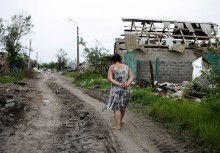“I believe that our country will see peace return and reconstruction start someday, and we will need our industry at that very moment to ensure that people have jobs, taxes are paid, and social guarantees implemented,” general director of Metinvest company (a subsidiary of the SCM group) Yurii Ryzhenkov said. He also reported that all production units of his company were in operation as he spoke, but plants in cities of Yenakiieve and Khartsyzk, still held by the so-called Donetsk People’s Republic, were still in a difficult situation, just as mines of Krasnodonvuhillia concern located in the territory held by the so-called Luhansk People’s Republic, as coal shipments were impossible due to problems on the railway, and the concern was running up its inventory. According to Ryzhenkov, Mariupol, where two largest of the company’s metallurgical plants are located, was in good working order (the integrated plants decreased output in early August due to shortages of raw materials, but the problem had been solved), and Azovstal plant had even put its third blast furnace back into operation. Avdiivka Coke Plant, the top manager believed, was still a hot spot on the map of Donetsk region, as fighting continued in Yasynuvata. Moreover, Ryzhenkov stated that this chemical plant was receiving power via only one of its four power lines, forcing all the shops to operate at low rates – “we are again teetering on the edge of a stoppage.”
It can be seen from these reports that the industrial empire of the uncrowned king of the Donbas Rinat Akhmetov is still holding fast (Ryzhenkov said they were not counting losses yet, prioritizing preservation of personnel and equipment), and does not look as a colossus with feet of clay even in this situation. In the current situation, the company, according to Ryzhenkov, had August and September output contracted, and Metinvest was able to repay eurobonds out of its own cash flow.
However, the empire, which was omnipotent just a short time ago, has almost lost its former political influence. It seems that it wants to compensate for this loss on the humanitarian front, becoming a center of assistance for peaceful people of the Donbas, above all children, the sick, the disabled, retirees, and those who have lost their homes or are persecuted. This work has been conducted by Rinat Akhmetov’s Development Foundation. Just as Ryzhenkov informed the press about his company’s efforts to survive under war conditions, the foundation’s chief Anatolii Zabolotny told us how many people and at what cost in human effort and risk had been rescued from the warzones and pulled out of the rubble by its volunteers.
Is it just a PR drive? SCM’s director for PR Natalia Yemchenko expected such a claim. “If it was PR on our part, we would have brought here a pile of photos depicting children, women, and the disabled who have been rescued by us,” she told the press. The same press conference saw SCM announcing establishment of the dedicated humanitarian headquarters at the foundation. Yemchenko introduced to the public its coordinator Rymma Fil. “Previously, our most important task was to take people out of the warzones,” Fil said, “and help them find some temporary housing, but the crisis’s scale has gone up enormously. According to the UN, half the population of Luhansk has left the city, and it is a huge number. A lot of people have left Donetsk as well, with numbers easily in tens of thousands. This is happening on the eve of September 1, when school-age children are to go to school, and students are to go back to university. The evacuees just have nowhere to live. They are mostly staying at summer resorts and children’s camps for now, but starting in mid-September, and in any case from October on, these places will become unlivable. Meanwhile, the issue of humanitarian aid is being suddenly transformed from personal problems to ones involving entire cities. It is especially scary when people are bedridden...” Fil promised that the humanitarian headquarters would continue the foundation’s work, just on a larger scale.
Zabolotny revealed that his foundation has moved out of the anti-terrorist operation area 18,000 people, or 15 percent of all those who managed to leave this scene of terror, and time was often of crucial importance. According to the director, most newspapers have republished the famous picture of a woman killed while she held her baby, but few people know that she could leave the region on that day, which turned out to be the last in her and her child’s lives, but she had asked for a delay to gather her belongings... Another story involved the separatists prohibiting orphans from leaving their orphanage. They were then given little flags and led towards the railway station, supposedly for a walk... The ruse worked, and the kids got into their railcar and went away unnoticed...
Meanwhile, as we are moving closer to the restoration of peace, more and more people are drafting less than totally altruistic plans. For example, MP from the group For Peace and Stability, the leader of the Liberal Party of Ukraine Mykhailo Opanashchenko posted on Facebook on August 9: “The Donbas has huge reserves of natural resources, as well as highly skilled workers and engineers. That will be enough to rebuild all the destroyed infrastructure and businesses in a year or less. These resource-dependent businesses are now being taken over by force of arms. We see ongoing struggle for resources and their ownership. Therefore, we need to implement a program of nationalization as fast as possible.” How sincere is he, and what do his intentions have in common with peace and liberalism? A hurried redistribution of property is known to bring a lot of unpredictable consequences for a nation. It is unlikely to promote peace or liberalism, but is full of populism, which we are fed up with.
Still, maybe our experts will have a different opinion of it?
Oleksandr BONDAR, former head of the State Property Fund of Ukraine and MP:
 “I think that nationalization, unfortunately, will not solve any of the problems we are facing now, because it will just shift the responsibility for all these businesses stolen by oligarchs back to the state, even as they are in poor shape and in dire need of modernization.
“I think that nationalization, unfortunately, will not solve any of the problems we are facing now, because it will just shift the responsibility for all these businesses stolen by oligarchs back to the state, even as they are in poor shape and in dire need of modernization.
I would suggest another option: make their owners to bear the entire burden of reconstructing the Donbas, including their own businesses as well. In this way, the state and ordinary citizens, who had nothing to do with the events in the Donbas, will not need to fund the reconstruction of this area. Let those who have plundered the region since Ukraine’s independence do it. It is very easy to do. All business owners are known. The state leadership needs to gather them and assign tasks. Should they refuse, other methods of influencing these people may be employed, including nationalization.
I think they would agree out of fear of deeper losses.”
Oleksandr KIRSH, corresponding member of the Academy of Economic Sciences of Ukraine, council member of the Union of Small, Medium, and Privatized Enterprises of Ukraine:
 “I understand that Opanashchenko talked about Akhmetov. I would add Dmytro Firtash to this group as well. Ihor Kolomoisky is probably safe because of his lofty civic virtue. I
“I understand that Opanashchenko talked about Akhmetov. I would add Dmytro Firtash to this group as well. Ihor Kolomoisky is probably safe because of his lofty civic virtue. I
t is clearly an abnormal situation when thousands of people are dying, being left homeless and literally turned into beggars, while a few lucky individuals, having benefited from a wild privatization at one time and got to own virtually all the national wealth, keep evading taxes, transferring their profits offshore, and even dare oppose the civil society. However, nationalization should be carried out lawfully, by non-revolutionary means. It should be seen as a punishment for violating the law in the conduct of business and, above all, for tax evasion.
If the offense is proven, it is a legal justification for nationalization or de-privatization. Moreover, the less taxes trey have paid, the less compensation they should receive on nationalization. I am confident that no oligarch has paid all their taxes. Should someone be able to prove their good faith and adequacy of their tax burden, all the better for them. I assure you that neither Akhmetov nor Firtash will be in that number.”
Volodymyr PANCHENKO, economic advisor at the company Open Dialog:
 “It is surprising that the Liberal Party is proposing nationalization. If true, it would have to rename itself to Socialist or Communist Party. Besides, the resources which are supposedly liable to nationalization are not that attractive. We know that the Donbas coal is an uncompetitive resource, and it cannot regain its competitiveness. Back under the Soviets, the calculations showed clearly that there was enough of Kuzbass coal to replace the Donbas completely. It cannot be changed. Therefore, nationalization is out of question. One cannot compare the investment appeal of privatized and nationalized enterprises as well. Firstly, it is known to be much higher in the former case. During hard times, the government may, of course, enter into public-private partnerships with business owners to help them start operations and find investors, although the latter is very hard to do. Investors want to start their business from scratch, to make everything meet their standards. They see no profit in renovating old inefficient buildings or repairing equipment that is well and truly obsolete. I recently dealt with a major investment project in which the investor was satisfied with Ukrainian personnel, but was disgusted with antiquated buildings, and a good deal of money has failed to enter Ukraine in the end of it. They prefer to build standard plants which reflect the latest energy conservation requirements. In general, construction of new plants typically costs four times less than reconstruction of old ones. Thus, nationalization, and especially in the Donbas at this time, is a wrong policy. I would oppose it strongly!”
“It is surprising that the Liberal Party is proposing nationalization. If true, it would have to rename itself to Socialist or Communist Party. Besides, the resources which are supposedly liable to nationalization are not that attractive. We know that the Donbas coal is an uncompetitive resource, and it cannot regain its competitiveness. Back under the Soviets, the calculations showed clearly that there was enough of Kuzbass coal to replace the Donbas completely. It cannot be changed. Therefore, nationalization is out of question. One cannot compare the investment appeal of privatized and nationalized enterprises as well. Firstly, it is known to be much higher in the former case. During hard times, the government may, of course, enter into public-private partnerships with business owners to help them start operations and find investors, although the latter is very hard to do. Investors want to start their business from scratch, to make everything meet their standards. They see no profit in renovating old inefficient buildings or repairing equipment that is well and truly obsolete. I recently dealt with a major investment project in which the investor was satisfied with Ukrainian personnel, but was disgusted with antiquated buildings, and a good deal of money has failed to enter Ukraine in the end of it. They prefer to build standard plants which reflect the latest energy conservation requirements. In general, construction of new plants typically costs four times less than reconstruction of old ones. Thus, nationalization, and especially in the Donbas at this time, is a wrong policy. I would oppose it strongly!”







